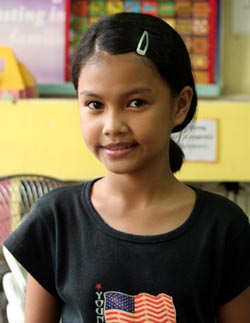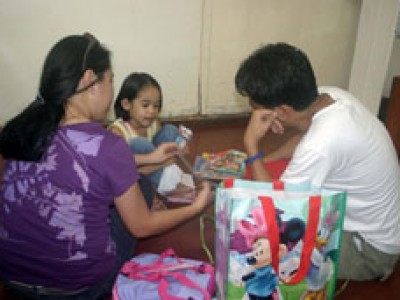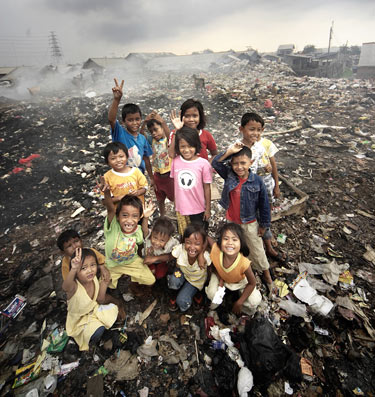A Young Missionary
Patricia lives in one of the crowded slum communities of Santa Mesa, Manila and that is known as breeding ground for thieves, criminals and prostitutes.
The winding path to her home is so narrow that only one person at a time can pass through. Children play and run along the narrow maze of alleyways, throwing rocks at houses, cursing at people and threatening other children. They are noisy, dirty and disrespectful.
 Patricia had enough of them and one day decided to do something about it. She decided to teach them the Bible so that they can change their ways. She gathered these rowdy children aged 5 to 10 years old so that she can teach them about Jesus.
Patricia had enough of them and one day decided to do something about it. She decided to teach them the Bible so that they can change their ways. She gathered these rowdy children aged 5 to 10 years old so that she can teach them about Jesus.
Patricia is only 12 years old.
“I teach them about Jesus … so that they can become better children. At first, it was just a teacher-student game but soon I realized that I could actually teach these children for real.”
For two years now, she has taught the children every Sunday afternoon at 1 p.m., with an average of 11 students at a time. (more…)
Continue Reading ›Jesus Knows Me
You’ve met Rafonzel once before. In the photo at the end of Eric’s post about the Leadership Development Program.* But photos are so last year. 🙂
Watch this short video (just under 10 minutes) and you’ll hear Rafonzel talk about the meaning of Compassion’s programs in her life – like Michelle did – and you’ll see Rafonzel meet her sponsor for the very first time – like Esther described for us yesterday.
*This content honors our historical Leadership Development Program. To learn more about our current youth development opportunities, click here.
Continue Reading ›
A Sponsorship Story for Ordinary People
We are the Brasile family from Hamden, Connecticut: Thomas and Esther. We have two daughters, Larissa and Leah. We believe in the ministry of Compassion International. This story is written by Esther.
Michelle Tolentino
Leadership Development Program graduate Michelle Tolentino talks about the value and meaning of Compassion’s programs in her life.
A Chance to Survive
Hello Compassion Blog readers.
Sorry I haven’t contributed much lately. I’m still here and still handling crisis communications, in case you were wondering. There is something that has been on my mind that I feel compelled to share with you.
I’m gonna step outside my comfort zone for a minute to share this with you. I have Rheumatoid Arthritis. I was diagnosed with it when I was 15, so I’ve had it for half my life, but you’d probably never know it if you met me. I don’t talk about it much. Most people I interact with on a regular basis don’t even know. In the past 10 years, the medical research and pharmaceutical industries have come a long way in treating the disease, and this has allowed me to live to a virtually pain-free, symptom-free life.
But here’s the thing. I have a normal life simply because I happen to have been born in the United States. I have access to powerful drugs. I have insurance to cover the (outrageously high) cost of them. Certainly I am grateful for this, but lately I’ve been thinking about what my life would be like if I were born into poverty in a developing country. What if I was from rural Rwanda? Or a slum in the Philippines? Or a poor community in Nicaragua?
I’d more than likely be totally crippled by now. At 30 years old.
This thought really freaks me out, to be honest with you. I cannot imagine what it would be like to not be able to stand up straight, to walk, or to grip things. To live in constant, life-altering pain. I feel guilty for being happy I was born here. I don’t have to try to live with this disease without the help of drugs. I am not crippled. I assume it’s similar in a way to the guilt a person feels when they survive a car accident where the other passengers died . . . the ugly injustice of it. I understand that God’s ways are higher than our ways, but I struggle to understand why He chooses for some — why He chose ME — to be born into affluence and why He chooses some to be born into poverty. It’s not fair.
Nowhere is this injustice more evident than in the fight against HIV and AIDS. December 1 was World AIDS Day, and Brianne told you about our AIDS Initiative. The amazing thing about this program is that it literally restores justice to an unjust world. Without access to antiretroviral drugs, those battling AIDS in poverty-stricken countries fight an unwinnable war. By providing the antiretroviral therapy, Compassion allows children with death sentences another chance at life. A chance that, had they been born here, they would have had simply by virtue of their nationality.
If anyone is in the position to get this, it’s Godfrey. He understands that he is alive today because Compassion is fighting the injustice of HIV and AIDS in Uganda. His life is his testimony.
Compassion’s AIDS Initiative is more than just drugs. It’s nutritional support. It’s the critical laboratory testing. It’s psychosocial support. It’s treatment of opportunistic infections. It’s transportation assistance. It’s income generation. It’s housing repair. It’s all the opportunities that a person suffering from HIV here in the U.S. would have.
The AIDS Initiative essentially levels the playing field to give every victim of HIV — no matter where they were born — an equal chance to survive this devastating disease.
Give someone a chance to survive by supporting the AIDS Initiative today.
A New Beginning for Eric
Compassion seeks to register the poorest children around the world, and Eric in the Philippines is one of them. Compassion gives hope to those who need it most.
Based on its studies on poverty, Compassion in the Philippines identified Rio Tuba as one of the neediest towns in the country, and Eric’s family is the neediest of them all.
In this isolated town where only one bus line is willing to travel from the main city, Eric’s family is even cut off from the rest of the residents. They live in an unfinished, tiny bamboo hut in the middle of an open field. Although from time to time their closest neighbor gives food and offers help, he often mocks them for their predicament.
Eric’s father, Benny, is a carpenter. He used to earn a daily income of US$5.60 when there was available work. This was not enough to feed his seven children. Since his wife left them in March 2008, Benny stopped working completely to take care of his children full time. (more…)

What Does Sponsorship Mean? (I Didn’t Think I Would Cry)
I know poverty. I have lived with it. So I wasn’t expecting anything out of the ordinary on my way to Shan’s house. I was carrying two bags of groceries as I negotiated my way through the crowded neighborhood. Then I stopped. I literally felt a thud on my heart and tears began to roll.
10 Questions With Edwin Estioko
Recently, we gave you the chance to ask Edwin Estioko, our Field Communication Specialist in the Philippines all your burning questions about himself, the Philippines and Compassion in the Philippines. Here are his answers …
1. Can you tell about the time when you first decided to work for Compassion? (Catherine)
Before Compassion I was production manager for OMF Literature (the biggest Christian publisher in the Philippines) and a writer of children’s books. I grew up at church serving and teaching little children; playing with them and just enjoying their company. When I saw the ad for a Communications Specialist for Compassion International in the Philippines, I was literally drawn in. Feeling a strong sense of peace and confidence that the Lord was calling me to this beautiful ministry for children, I applied for the post and on the same week filed for resignation from OMF despite not knowing for sure whether Compassion would hire me or not. Thank God they did.
2. What goals do you hope to accomplish in your area? (Jason)
I hope that through the photographs I take and stories I write about Filipino children I could reach as many readers as I can around the world so that more and more people would stand up for children and advocate for them, so that more and more could see that thousands of children and families here in the Philippines truly lack opportunities for a better life (or simply for a livable minimum) despite the fact that they are hard working and full of faith.
What drives me is Proverbs 31:8, “to speak up for those who cannot speak for themselves.”
3. What have been the toughest times of your life, and what have you learned from these trials? (Juli Jarvis) (more…)
Ask the Field: Uganda and the Philippines
Have you ever wondered what it’s like to live in the country where your sponsored child lives? What it’s like to work for Compassion? What gets the people going who do this work each day? If so, now’s your chance to “Ask the Field!”
Ask your burning questions of our staff from around the world about their country, their work — whatever you want to know. I’ll choose 10 of your questions for them to answer. (Being the protective mother bear that I am, I’ll make sure to choose culturally appropriate questions. What’s polite dinner conversation in the U.S. may not be appropriate in their country, so keep this in mind as you ask.)
I’d like to introduce to you Dennis Tumusiime and Edwin Estioko.
 Dennis is a native of Uganda and works as a tours and visits specialist for Compassion International Uganda. (Did you know that Compassion doesn’t send a bunch of Americans over to other countries to minister to the children, but works through natives of that country so they can culturally contextualize the ministry? That’s pretty cool.) Anyway, Dennis has been working for two years with Compassion to coordinate and plan visits from sponsors and donors to Uganda. (So, if you visit Uganda, you’ll probably get to see that smiling face!) Coordinating all these trips means he’s quite an adventurous man.
Dennis is a native of Uganda and works as a tours and visits specialist for Compassion International Uganda. (Did you know that Compassion doesn’t send a bunch of Americans over to other countries to minister to the children, but works through natives of that country so they can culturally contextualize the ministry? That’s pretty cool.) Anyway, Dennis has been working for two years with Compassion to coordinate and plan visits from sponsors and donors to Uganda. (So, if you visit Uganda, you’ll probably get to see that smiling face!) Coordinating all these trips means he’s quite an adventurous man.
 Edwin Estioko began working for Compassion six years ago and is originally from Quezon City, Philippines. He is Compassion’s Field Communication Specialist in the Philippines and writes stories about and takes pictures of the ministry that is happening through Compassion International Philippines. He is married with no kids, so he and his wife can easily consider all the Compassion children as their own.
Edwin Estioko began working for Compassion six years ago and is originally from Quezon City, Philippines. He is Compassion’s Field Communication Specialist in the Philippines and writes stories about and takes pictures of the ministry that is happening through Compassion International Philippines. He is married with no kids, so he and his wife can easily consider all the Compassion children as their own.
Dennis and Edwin are excited to answer your questions, so ask away!
Because of Compassion
See what our friend Eric “chappyphoto” Chapman has done. He created a Servant Life video from his trip to the Philippines. Actually, he did the sound and music. The rest was done under the keen direction of Taylor Robinson at Student Life.
Now, you can read about it and watch about it … uh … yeah. Watch about it.
Non-Traditional Family Traditions
Many of Compassion’s sponsors are young families. Our family fits that category with children 9, 6, 5 and 2 years old. Not only do we want to help little ones overseas, my wife and I want our own children to realize the hope-stealing effects of poverty. We want our kids to understand poverty to a point where they’re compelled to do something about it both now and later.
Do you think this way? What traditions have you started in your own home to cultivate an understanding of what the poor go through in the developing world? We’re just starting out, and I know we can get more consistent, but here’s a glimpse of what we do:
-
- I made an 8-by-10 print of this picture taken by Tonny Tunya. It’s in our dining room. Occasionally, we pause to see whatever we’re facing through the bright eyes of these children whose playground is a garbage dump in Indonesia. At best, our conversations are speculative. But there’s truth in these talks, too. And our perspective is refined bit by bit.

- When we sit down for a meal and make the effort to think about Karen, our sponsored child in the Philippines, and her family, our gratitude to God for the food in front of us grows deeper.
- We’re moving in the direction of connecting each one of our kids to a different sponsored child. They’ll get to minister and be ministered to through sharing words of hope, art and prayers. Who knows? Maybe our kids will be some of the few of their generation to have a true pen pal.
- I’m memorizing verses about children and the poor and my son is helping me. I hope that these scriptures sink in for him, too, and that seeing his dad take the time to do this would inspire him.
I’m sure there are many other ways to teach children about poverty through day-to-day life. I’ve heard of kids initiating fund raisers and families who rethink gift-giving at Christmas. Some of these families have even gone on one of Compassion’s sponsor tours to see it all with their own eyes.
Would you take a few moments to share your traditions? It’s OK if you don’t do them 100 percent of the time. None of us do. But we want to. And it’d be great to learn from others. The kids need it. Ours and theirs.
Focusing on the Leadership Development Program
I’ll start by saying this: It’s very hard to explain impact a Compassion trip can have on a person.
For most of my life, the only thing I knew about poverty was the Sally Struthers commercials. You know, those spots from the ’80s with all the slow-motion shots of children crying. I have been given the opportunity to go with a video production crew to various countries to film the work of Compassion. In some way, I expected to see this Sally Struthers image. I was totally wrong.
I’m a sound engineer for Student Life. We produce large camps, conferences and a variety of additional resources for churches. About the time I started working there, Student Life had just partnered with Compassion. Since then we’ve always had a Compassion presentation at our events, and work to educate our attendees about what sponsoring a child means.
Last year we were sent to Uganda to interview students from Compassion’s Leadership Development Program* (LDP). Our hope was that some of the students would travel with our camp teams throughout the summer and lead the Compassion presentation from stage. What better way to show the work of Compassion than to put living proof of that work on stage?
Before this trip I had already been on one Compassion video shoot, but it was a 48-hour whirlwind trip to Guatemala. It was a fast turnaround, and we were only able to see a few children. Our video focused on one child’s experience meeting her sponsor. I could see the impact Compassion was having on a single child, but what would the finished product look like? All I knew going into the Uganda trip was that LDP students had grown up through the Compassion child sponsorship program, graduated, and were then sponsored through college. These students were the cream of the crop.
 We arrived in Kampala and tried to get some rest. The next morning we had our first LDP student interview. His name was James.
We arrived in Kampala and tried to get some rest. The next morning we had our first LDP student interview. His name was James.
This was initially a typical setup for our team. We had done hundreds of interviews. What I did not know was that my life and perspective of Compassion would be changed forever by the testimony of this man.
James was more educated, well spoken and passionate about his relationship with God than I could say I have ever been. He described his childhood –- one that was riddled with loss of parents and siblings, leaving him alone to live with an aunt. He spoke of being malnourished and without hope. Then he said all that changed when he joined Compassion.
I could have probably predicted most of his interview to this point. We had asked most of the questions, and it was the picture of so many nonprofit companies and others who serve those less fortunate than most Americans. He was a child in poverty who was given a chance. It was his answer to our last question that stopped us all cold. (more…)


